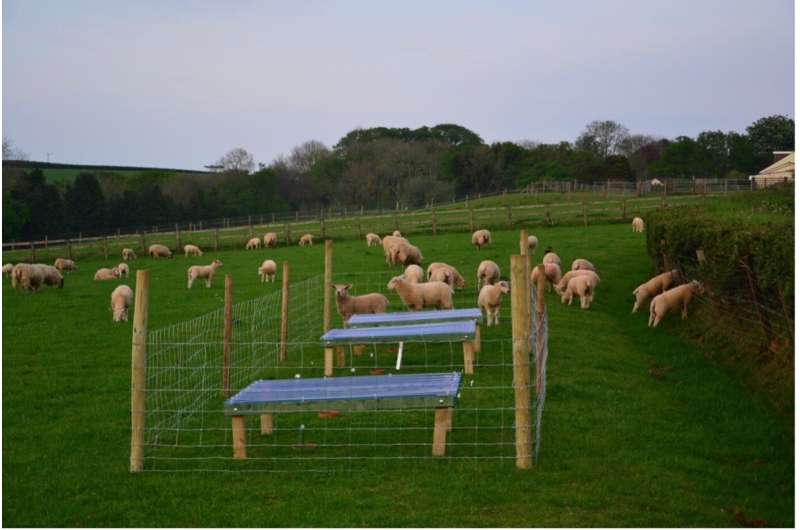Picture of an intensively managed grassland from M. Chomel. Credit: University of Manchester
New research led by a team of scientists from The University of Manchester has shown that intensive grassland management impairs the capacity of soils to buffer extreme droughts, which are becoming more frequent and intense.
The study investigated how management of grasslands across northern England modifies the transfer of recently photosynthesised carbon by plants to roots and soil organisms and the transfer of soil nitrogen to plant and soil organisms following a severe drought.
The team found that intensive management reduced the below-ground transfer of carbon photosynthesised by plants to roots and soil biota after drought. This impairs the capacity of carbon transfer belowground to recover whereas under extensive, more traditional grassland management, this below-ground transfer of plant carbon to soil biota was less disrupted and hence more able to buffer the effects of extreme drought.
Dr. Chomel, the lead author of the paper, said: "Soils contain a vast diversity of organisms crucial to key soil processes like carbon and nitrogen cycling. Our study shows that interactions between plants and soil organisms are vital for helping soil to resist to climate extremes, such as drought, which are already more common."
"It is remarkable how intensive management reduces the transfer of carbon to beneficial root-associated fungi compared to more traditional grassland management consistently across the three sites. This result shows that intensive management disrupts plant-fungal pathways of resource transfer impacting key soil fauna like detritivorous mites."
"Grasslands are under multiple threats including intensive management practices and climate change, including extreme climatic events. A major challenge is to understand how these drivers interact to help inform sustainability policy aimed at protecting the multiple ecosystem services that grasslands provide and enhance their resilience to future climate change."
Prof Johnson, who was part of the research team at Manchester, said: "This research highlights how extensive management tightens the linkage between plant and soil communities, which makes these systems better able to resist climate extremes like drought."
Prof Bardgett, who was also part of the Manchester team who coordinated the project, said: "We hope that this research will help us to advise farmers and landowners to optimise the way they manage land to benefit from the living soil and improve how grasslands resist and recover from perturbations."
The study was done by simulating a severe drought event in three paired extensively and intensively managed mesotrophic grasslands in the Yorkshire Dales National Park. This study was part of a large project working on 15 paired grasslands sites in the UK representing a range of soil types and climatic conditions in Aberdeenshire, North Yorkshire and Devon.
By using non-radioactive stable isotope tracers (13C and 15N), the researchers were able to accurately trace the transfer of carbon recently photosynthesised from plant shoots to roots and soil organisms, as well as the transfer of soil nitrogen into plants and soil organisms. These detailed measurements allowed them to disentangle the interaction between soil organisms, and carbon and nitrogen cycles.
The study was led by Dr. Mathilde Chomel, a former postdoctoral research associate at The University of Manchester, Department of Earth and Environmental Sciences, who is now working at The Research Institute of Organic Agriculture (FiBL France). The project was coordinated by The University of Manchester Professors David Johnson and Richard Bardgett—both based in the University's Department of Earth and Environmental Sciences—and involved an international team of researchers from the University of Edinburgh, University of Dublin, University of Colorado, University of Amsterdam and Queen's University of Belfast.
The findings are published in the journal Nature Communications in a paper entitled "Intensive grassland management disrupts below-ground multi-trophic resource transfer in response to drought."
More information: Mathilde Chomel et al, Intensive grassland management disrupts below-ground multi-trophic resource transfer in response to drought, Nature Communications (2022). DOI: 10.1038/s41467-022-34449-5
Journal information: Nature Communications
Provided by University of Manchester























